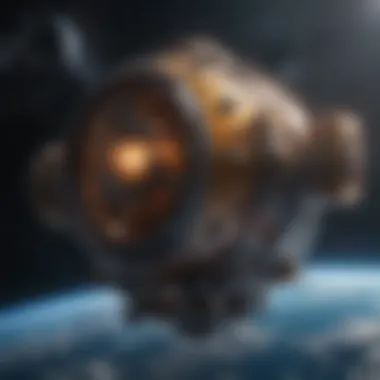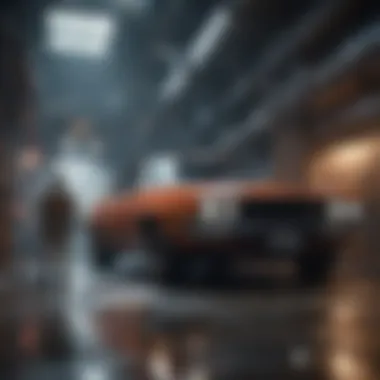Top Science Fiction Films That Defined 2021


Intro
In the landscape of cinema, 2021 emerged as a notable year for science fiction. This genre, constantly evolving, captivated audiences with its blend of imaginative concepts and real-world reflections. People were eager to see narratives that not only entertained but also provoked thought, exploring the intertwined fates of technology and humanity. From dystopian scenarios to exploration of the cosmos, the film offerings of 2021 have left a significant mark.
The array of releases introduced unique storytelling techniques alongside striking visuals, igniting conversations among fans. Films have become a mirror, reflecting our contemporary fears and hopes, thus intensifying the impact sci-fi has on culture.
Throughout this article, we will unpack the best sci-fi films of 2021. Let’s dive into the crucial elements that crafted these films and the lasting impressions they left on audiences and critics alike.
The Landscape of Sci-Fi in
In the theater of modern cinema, science fiction stands out like a beacon, casting long shadows of curiosity and imagination. The landscape of sci-fi in 2021 was particularly significant, marking a turning point for filmmakers and audiences alike. It wasn't just about escapism; it mirrored the very essence of our contemporary struggles and aspirations. More than a vehicle for special effects and outlandish narratives, these films intricately wove threads of urgent societal issues, showcasing how science fiction can reflect our current reality while also pushing the envelope toward what might be.
Trends in Science Fiction Cinema
As the proverbial curtain rose on 2021, several trends began to emerge within the sci-fi genre. A noticeable shift leaned towards narratives centered around sustainability and environmental awareness. Filmmakers seemed to have taken the hint from the state of the world, crafting stories that delved deep into our connection with nature. Heights unraveled in films that questioned our relationship with technology, forcing viewers to ponder if our digital lives enhance or entrap us.
The rise of diversity in storytelling was another enormous trend. Science fiction, once dominated by a narrow scope, started embracing a broader array of voices. Films featuring protagonists from varied backgrounds highlighted the importance of inclusion. This cultural shift not only expanded narratives but also allowed for new and refreshing perspectives that resonated with increasingly diverse audiences.
- Unique concepts such as AI ethics and deep space exploration surfaced as recurring themes.
- Anticipation grew around the blend of genres, with sci-fi mingling seamlessly with horror and drama, creating unexpected yet compelling narratives.
Impact of the Pandemic on Film Releases
The COVID-19 pandemic cast a long shadow over every facet of life, including cinema. The 2021 sci-fi landscape was shaped by the ongoing pandemic in more ways than we could ever imagine. Many planned releases were delayed or shifted to streaming platforms, making the experience of watching sci-fi films at home a new norm. For some, this transition was a bittersweet symphony—while it allowed accessibility, it also stripped away the communal essence of a theater experience.
In effect, the pandemic prompted filmmakers to rethink traditional storytelling approaches. Concepts of isolation, uncertainty, and even dystopia became prevalent. The genre not only entertained but also served as a means to process collective anxieties, pushing audiences to confront existential questions while wrapped in the familiar comfort of thrilling narratives.
"Science fiction is to the 21st century what the novel was to the 19th. It reflects our dreams and fears, but we often don’t realize it until we look back."
- Unknown
As we dissected and scrutinized the films of this particular year, it became clear that the impact of the pandemic transformed the realm of sci-fi, breathing new life into its relevance, ultimately shaping narratives that resonated with our shared human experience.
In the face of adversity, sci-fi in 2021 stood tall, a genre that thrived by reflecting the reality of the times while also promising hope for the future. Whether through vivid storytelling, adventurous plots, or the exploration of deeper themes, it became evident that science fiction was not just a genre but a living commentary on our society.
Key Sci-Fi Films of
The year 2021 marked an important chapter in the world of science fiction cinema. Not only did the genre provide audiences with thrilling escapism, but it also posed critical questions about contemporary issues. Various films emerged as icons, showcasing unique storytelling techniques and visual craftsmanship that stirred audience imaginations. The key films of this year served as reflections of society while propelling the genre forward through innovation and exploration.
Dune
Adaptation of Frank Herbert's Novel
The adaptation of Frank Herbert’s Dune reignited conversations around faithfulness in adaptations. This film, directed by Denis Villeneuve, approached the sprawling novel with a meticulous lens, striving to capture the complexities of its world and characters. The key characteristic of this adaptation lies in its ambition to honor the source material while making it accessible for a new audience.
A distinctive aspect here is how Villeneuve manages to translate intricate political and philosophical themes into a visual experience. Fans of the book appreciated the detail given to lore and world-building, which often gets lost in cinematic renditions. The nuance found in Dune is a beneficial takeaway for anyone examining adaptations in the sci-fi space.
Cinematic Techniques and Visuals
Dune is a feast for the eyes. The cinematography, helmed by Greig Fraser, utilizes vast landscapes to create a sense of scale that is almost overwhelming. It emphasizes the isolation of characters in a daunting universe, which enhances the emotional depth. The striking visuals are a hallmark here, making the movie more than just an adaptation; it's an awe-inspiring journey.
Additionally, the use of practical effects, coupled with CGI, presents a unique feature. It not only grounds the film in believability but also reminiscent of classic sci-fi while retaining a modern essence. Such innovations elevate the experience of watching Dune, making it a pivotal piece in the 2021 sci-fi film landscape.


Thematic Depth and Cultural Context
In Dune, the thematic depth stretches beyond mere science fiction tropes; it addresses pressing concerns like colonialism, environmentalism, and the complexities of power. The connection to contemporary socio-political dialogues helps to contextualize its relevance within 2021.
What sets this film apart is how it intertwines cultural narratives through its characters. The exploration of lineage, choice, and destiny resonates, opening up space for discussions on heritage and responsibility. This intricate layering contributes a rare richness to the narrative—a characteristic that ensures its place in discussions of major cinematic achievements this year.
The Matrix Resurrections
Legacy of the Original Trilogy
The Matrix Resurrections dives deep into its rich mythos, examining the legacy of the original trilogy while integrated in a fresh narrative. This nostalgic return to a beloved universe sparked excitement—and skepticism—among long-time fans. The revitalization of iconic characters and themes serves to bridge the past with the present, making this a significant entry in both the franchise and the sci-fi genre.
A notable feature of this movie is how it directly addresses the passage of time, reflecting on innovation and evolution in technology, mirroring societal changes. For audiences, it feels like both a reunion and a new journey—a unique position that offers familiarity while daring to explore new questions around reality and identity.
Innovations in Action and Storytelling
Visually, The Matrix Resurrections innovates in action sequences with greater emphasis on choreography and practical effects. While retaining the signature slow-motion sequences fans adore, each action scene breathes new life into the genre, heightening engagement.
Moreover, the structure of its narrative garners attention by playing with audience expectations. The fourth installment takes risks that might not sit well with every viewer, but this boldness enhances its commentary around choice and existence—red pills and blue pills be damned.
Character Development and Timely Themes
In The Matrix Resurrections, character arcs reflect a critical introspection on growth and identity, seen clearly within Neo and Trinity's journeys. The film reveals their struggles and desires, positioning them within a contemporary framework that correlates technology with authentic human connections.
This aspect becomes a renowned conversation piece among viewers. The finishing touches of exploring love and partnership amidst an overwhelming digital landscape, a timely theme, resonate well with modern concerns of isolation and connection prompted by recent global events. Such relational dynamics elevate the narrative, addressing not just science fiction but the very essence of the human experience.
The Tomorrow War
Exploration of Time Travel Concepts
The Tomorrow War offers a fresh take on time travel, bending traditional rules associated with the genre. It intertwines the personal stakes of family with expansive world-building that thrives on imagination. This film presents a unique feature of narrative layering; for instance, the familial aspect imbues the time travel concept with emotional weight.
At its core, the film invites audiences to question the ramifications of choices, and whether one can truly escape their fate. This interaction with time travel makes it a compelling choice when examining the genre in 2021, revealing the potential for both action and philosophical exploration.
Star Power and Performances
Chris Pratt's leading role brings star power to The Tomorrow War. His performance is accompanied by a compelling cast that enhances the credibility of the film’s premise. The unique feature here is how performers embody their roles with an authenticity that allows audiences to relate to fantastical situations—bringing heart to the chaos.
However, the reliance on star power raises questions about whether big names overshadow character development. Despite the risks, the synergy between cast members brings an engaging dynamism that upholds the film's emotional resonance.
Public and Critical Reception
Upon release, The Tomorrow War found a mixed reception. While audiences embraced its entertainment value, critics noted its adherence to familiar tropes. Yet, it sparked lively debates about the merit of balancing spectacle with narrative depth. Such discussions serve as a crucial aspect of how audiences dissect contemporary sci-fi, determining what elements warrant success or downfall in these endeavors.
Finch
Post-Apocalyptic Narrative
In the realm of post-apocalyptic stories, Finch stands out by emphasizing human connection amidst desolation. It illustrates a narrative that revolves around survival but pivots to themes of companionship and legacy—enriching a typically bleak genre. The movie unfolds with a refreshing subtlety, revealing layers through its uncluttered storytelling.
This unique feature also acts as a reflective mirror to real-world scenarios where human resilience is seen in the face of adversity. By juxtaposing hope against despair, Finch becomes a poignant exploration of existence that refuses to accept a purely hopeless narrative, making it a vital piece in 2021.
The Role of AI and Emotion


Finch’s interactions with the AI character, played by Caleb Landry Jones, reveal the emotional capacity embedded within artificial intelligence. The film poses a striking question: Can machines experience feelings? This exploration challenges conventions surrounding technology’s role in our lives, making it relevant in today’s society.
A key characteristic in this examination of AI is the emotional depth that resonates with viewers, prompting introspection on relationships in the digital age. It’s a beneficial choice in the discussion of tech ethics and companionship, reflecting on where we are heading as we intertwine our lives with machines.
Comparative Analysis with Other Works
When compared to other films like I Am Mother or Ex Machina, Finch embraces warmth amid its themes, distinguishing itself in the niche of AI narratives. It stands out for this angle, lifting the lone survivor trope into a broader dialogue about joint existence with technology.
While some critiques point towards slow pacing and fewer action moments, this film advocates for emotional storytelling, a divergence that entertains yet invokes deep thought on the human condition.
The Handmaid's Tale: Season Four
Continuation of the Story Arc
The Handmaid's Tale: Season Four carries forward the intensity of its prior seasons, further expanding on the grim world originally constructed in the series. The narrative evolves in surprising ways, intertwining the fates of characters betrayed by their society, thereby keeping audiences hooked. The unique feature lies in its pacing which allows character development to unfold organically.
This continuation proves significant when it reflects societal concerns, as its medium resonates with a modern audience straddling a precarious line between power and resistance. As such, it becomes a key focal point in the exploration of contemporary dystopia within the sci-fi landscape.
Social Commentary and Relevance
The series amplifies its social commentary in Season Four. It boldly addresses topics such as women's rights, autonomy, and systemic injustice. The dialogue woven through episodes acts as a relevant reflection given the current societal climate, ensuring that it resonates with viewers on a deeper level.
Such integration of topical issues enhances its status as not just a story—but a critical lens through which viewers can examine the world they inhabit. This gives the series a unique advantage in the discussions surrounding perceived relevance, holding a crucial spot alongside cinematic works in the same genre.
Viewer Reception and Critical Acclaim
Critics and audiences alike praised the engaging storytelling of Season Four, albeit with some noting pacing issues. The acclaim for character arcs reinforces the series’ place among the year's best science fiction narratives. This resonance with viewers emphasizes its strength in thematic execution, ensuring its relevance amid the evolving landscape of contemporary sci-fi.
With such diverse narratives from these Key Sci-Fi Films of 2021, audiences found both entertainment and thoughtful considerations that elevated the genre. Each film presents its own unique insights while weaving together a broader conversation about humanity, technology, and society that continues to mutate.
Emerging Themes in Sci-Fi
The films of 2021 clearly show that science fiction is not just about gadgets and futuristic landscapes. Emerging themes highlight society's core concerns and universal truths, uniquely reflecting our zeitgeist. By diving into concepts such as identity, environment, and technology, filmmakers have created a tapestry that resonates deeply with audiences. These themes are not mere decorations but essential elements shaping narratives and eliciting emotional responses.
Exploration of Identity and Humanity
In 2021, the exploration of identity was a prevalent theme. Films like The Matrix Resurrections grappled with notions of self and the human experience in a world where technology often overshadows authentic connections. The characters confront their waking realities and the society that dictates their actions. It goes beyond mere existential questioning; it raises the stakes about what it truly means to be human—an inquiry as ancient as time.
- The duality of identities often surfaced, with characters wrestling between their perceived selves and their true selves.
- This theme serves to engage viewers on a personal level, prompting reflections about their identities amidst constant change.
"In this age of relentless social media, are we truly finding ourselves, or do we paint a picture for the world to see?"
Environmental Concerns and Dystopia
The environmental discourse took center stage as films portrayed future dystopias reflecting the current state of our planet. Titles such as Finch engaged audiences with stark imagery of a desolate world, starkly portraying what could happen if humanity continues on a destructive path. The bleak landscapes not only serve as setting but also symbolize the fragility of existence.
- Dystopian visuals compel viewers to confront uncomfortable truths about climate change and ecological responsibility.
- They prompt the question: can we undo the damage we've inflicted? The narratives often stir anxiety but also spark hope for redemption.
Technological Dependence and Ethical Dilemmas
As technology continues to evolve, so do the ethical questions surrounding its use. The films of 2021 display a growing unease about our relationship with technology. From AI companions in Finch to mind-bending experiences in The Matrix, each film serves as a mirror, reflecting society's inner conflicts about innovation and dependency.
- The portrayals of technological dilemmas delve into the consequences of playing god and the moral ramifications.
- They challenge viewers to ponder the future implications of human actions, balancing progress against ethicality.


This exploration of emerging themes positions 2021 as a pivotal year for science fiction, emphasizing that the genre remains a platform for examining pressing issues of our time. The nuanced storytelling and depth of themes review society's values and fears, making these narratives not just entertaining but profoundly relevant.
Cinematic Techniques and Innovations
In the ever-evolving realm of science fiction cinema, cinematic techniques and innovations play a pivotal role in bringing imaginative narratives to life. The year 2021 witnessed a surge in films that not only pushed the boundaries of storytelling but also redefined how tales are told on screen. With advances in technology, filmmakers had the tools to not only depict fantastical worlds but also immerse audiences in their richly constructed realities.
These innovations encompass various aspects such as special effects, visual design, and the intricate interplay of sound and music, each contributing to the overall atmosphere and emotional resonance of a film. As we traverse this exciting landscape, it becomes evident that these elements are more than mere embellishments; they are integral to the viewer's experience, guiding perceptions and evoking responses that are essential for any successful sci-fi piece.
Special Effects and Visual Design
When it comes to science fiction, the role of special effects cannot be overstated. They serve as a crucial bridge between the realms of imagination and reality. With films like Dune bringing large-scale battles and grand landscapes to vivid life, the efficacy of visual design became ever more pronounced. The seamless integration of practical effects with CGI allowed for a viewing experience that felt genuinely authentic. The gritty, sand-swept world portrayed in Dune grips the imagination.
Moreover, the commitment to detail in visual design highlighted a trend where creators focused on world-building, offering viewers a glimpse into meticulously crafted societies. The expansive desert terrains, the intricacies of spacecraft, and the ethereal representation of advanced technologies showcase the labor that goes into rendering these extraordinary visuals.
Stalwart visuals also resonate in The Matrix Resurrections. Keeping the genre fresh and engaging, the film brought innovative cinematography decisions to the forefront, combining high-speed action with mesmerizing visual effects that left viewers glued to their seats.
- Immersive World-Building: Films increasingly prioritize detailed environments, enhancing believability.
- Practical Effects: These lend a tactile quality, grounding the futuristic narratives.
- Integration of CGI: This expands creative possibilities and enhances viewer engagement.
Use of Sound and Music in Sci-Fi
Sound design and musical composition in science fiction films is another critical facet that adds depth to the storytelling experience. The right mix of sound effects and music can create an emotional landscape that enhances the narrative’s themes. In 2021, scores and soundscapes varied from grand orchestral pieces to minimalist electronic soundtracks, each tailored to fit their respective films.
Consider Finch, where the sound design helps to build an emotional bond between the characters and the audience. The use of ambient sounds mimics the desolate post-apocalyptic world, while the music evokes nostalgia, sometimes contrasting sharply with the bleak visuals. In contrast, the pulse-pounding score in The Tomorrow War drives action forward, propelling viewers into an adrenaline-fueled adventure.
"Sound is an underrated component of storytelling, yet it often shapes our emotional responses far more than visuals alone ever could."
The convergence of these elements—special effects, visual aesthetics, sound, and music—culminates in an enriched cinematic experience. As filmmakers harness these techniques, the boundary between the viewer and the fictional world begins to dissolve, leading to captivating storytelling that lingers long after the credits roll.
Audience Response and Critical Reception
Examining audience response and critical reception is crucial when analyzing the landscape of science fiction films from 2021. These elements not only illuminate how viewers perceive the movies but also reflect the broader cultural conversations surrounding them. Sci-fi, as a genre, often provokes thought and can stir up strong emotions, making the audience's feedback particularly significant. Understanding what worked and what didn't, from their perspective, enriches our appreciation for the artistry involved in these films and provides insights into trends and preferences in modern cinema.
Box Office Performance
Box office performance serves as a key indicator of a film's initial appeal and commercial viability. For sci-fi movies, this can be a double-edged sword. The most significant blockbusters of 2021, such as Dune, collected impressive ticket sales, surpassing early pandemic expectations.
Here are some notable points regarding box office trends in sci-fi:
- Strong Openings: Films like The Matrix Resurrections saw strong openings despite mixed reviews, showcasing a dedicated fanbase eager to reconnect with the franchise.
- Pandemic Effects: The pandemic undeniably affected many releases; some films opted for dual theatrical and streaming releases, impacting overall box office receipts. The Tomorrow War, streamed on Amazon, didn’t follow traditional box office patterns, yet was widely viewed during its release period.
- Counter-Trends: Conversely, innovative films that crossed into the sci-fi realm, like Finch, experienced limited box office exposure while drawing attention in critical discussions online.
Viewer Ratings and Reviews
Viewer ratings and reviews provide a deeper insight into audience sentiment than box office figures alone. Popular platforms like Rotten Tomatoes and IMDb showcase aggregated scores that enable viewers to gauge public opinion swiftly.
Here are some key insights into the viewer reception of 2021's sci-fi films:
- Diverse Reactions: A film like Dune received overwhelmingly positive reviews from critics and audiences alike, often praised for its visual storytelling and fidelity to Frank Herbert’s source material. Contrastingly, The Matrix Resurrections received mixed feedback, with audience reactions divided between nostalgia and critique of its direction.
- Social Media Influence: The modern interaction between audiences and films has shifted dramatically with social media platforms. Finch and The Handmaid's Tale: Season Four generated considerable discussions on platforms like Reddit and Facebook, further shaping viewer perceptions beyond traditional critiques.
- Subjective Experiences: Fans of sci-fi often approach these films with heightened expectations due to the genre's inherent complexity. Every review and rating encapsulates individual experiences, often highlighting how themes resonate with personal views or societal concerns.
"The audience's voice is nearly as important as the filmmaker’s vision; both shape the legacy of a film, especially in a genre as profound as science fiction."
In defining the critical reception of these films, it is essential to acknowledge both applause and disappointment. Understanding viewer ratings not only allows filmmakers to gauge their success but also shapes the future of science fiction cinema.
The End
The exploration of science fiction films in 2021 reveals a rich tapestry interwoven with complex themes, groundbreaking innovations, and significant audience engagement. As we reflect on the key films of the year, it becomes clear how these cinematic works not only entertained but also incited thoughtful dialogue on pressing societal issues.
Looking Ahead to Future Sci-Fi Trends
The landscape of science fiction is ever-evolving, and observing trends gives insights into what audiences might expect moving forward. Here are a few elements worth keeping an eye on:
- Diverse Storytelling: More filmmakers are stepping into the sci-fi genre from various cultural backgrounds, weaving narratives that reflect a broader spectrum of human experiences.
- Technology as a Subject: Films will likely continue to grapple with the implications of technological advancements, especially concerning AI and surveillance.
- Sustainability Themes: With environmental challenges on the rise, filmmakers are expected to dive deeper into dystopian scenarios that mirror potential futures shaped by climate change.
- Narrative Depth: As audiences become more discerning, there is a push for stories that challenge conventional wisdom and provoke critical thought.
This melding of creativity and social commentary can lead to a deeper appreciation of sci-fi films, making them not just escapist entertainment but also mirrors reflecting our contemporary anxieties and aspirations. Thus, keeping a close watch on these emerging trends will enrich our understanding and enjoyment of future cinematic offerings.



